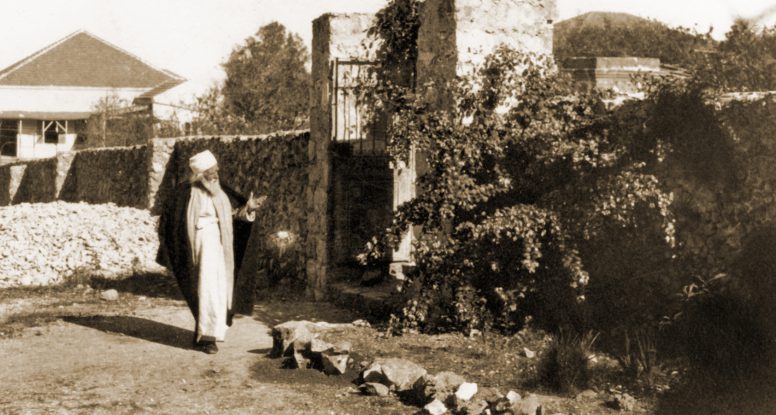
The Significance of ‘Abdu’l-Bahá
The following article is from bahai.org. Photo above: ‘Abdu’l-Bahá walking outside 7 Haparsim Street in Haifa, c. 1919, © 2017 Bahá’í International Community
“SELDOM HAVE I SEEN one whose appearance impressed me more,” said Professor Edward G. Browne of Cambridge University after meeting ‘Abdu’l-Bahá. “About the greatness of this man and his power no one who had seen him could entertain a doubt.”
Yet, however magnetic ‘Abdu’l-Bahá’s personality or however penetrating His insights, such tributes cannot adequately capture such a unique character in religious history. The Bahá’í Writings affirm that “in the person of ‘Abdu’l-Bahá the incompatible characteristics of a human nature and superhuman knowledge and perfection have been blended and are completely harmonized.”
The Center of Bahá’u’lláh’s Covenant
The question of religious succession has been critical to all Faiths. The ambiguity surrounding the true successors of Jesus and Muhammad, for example, led to differing interpretations of sacred scripture and deep discord within both Christianity and Islam.
Guaranteeing through ‘Abdu’l-Bahá a Center to Whom all would turn was the means by which Bahá’u’lláh could diffuse His message of hope and universal peace to every corner of the world. This Covenant was the instrument that ensured the unity of the Bahá’í community and preserved the integrity of Bahá’u’lláh’s teachings. Without ‘Abdu’l-Bahá as its Center, the enormous creative power of Bahá’u’lláh’s Revelation could not have been transmitted to humanity, nor its significance fully comprehended.
‘Abdu’l-Bahá interpreted the teachings of His Father’s Faith, amplified its doctrines, and outlined the central features of its administrative institutions. He was the unerring guide and architect of a rapidly expanding Bahá’í community. In addition, ‘Abdu’l-Bahá exemplified such perfection in His personal and social behaviour, that humanity was given an enduring model to emulate.
Proclaiming Vital Truths
In His Writings and during His travels, ‘Abdu’l-Bahá tirelessly proclaimed certain vital truths to leaders of thought as well as to countless groups and individuals. Among these truths were: “The independent search after truth, unfettered by superstition or tradition; the oneness of the entire human race, the pivotal principle and fundamental doctrine of the Faith; the basic unity of all religions; the condemnation of all forms of prejudice, whether religious, racial, class or national; the harmony which must exist between religion and science; the equality of men and women, the two wings on which the bird of humankind is able to soar; the introduction of compulsory education; the adoption of a universal auxiliary language; the abolition of the extremes of wealth and poverty; the institution of a world tribunal for the adjudication of disputes between nations; the exaltation of work, performed in the spirit of service, to the rank of worship; the glorification of justice as the ruling principle in human society, and of religion as a bulwark for the protection of all peoples and nations; and the establishment of a permanent and universal peace as the supreme goal of all mankind.”
The Servant of Glory
‘Abdu’l-Bahá affirmed time and again that He was a “herald of peace and reconciliation”, “an advocate of the oneness of humanity”, and an agent calling humanity to the “Kingdom of God”.
Despite the acclaim given to Him, ‘Abdu’l-Bahá always made clear that Bahá’u’lláh was the Source of His thought. In a letter to His followers in America He wrote: “My name is ‘Abdu’l-Bahá (lit. “Servant of Bahá’u’lláh”). My qualification is ‘Abdu’l-Bahá. My reality is ‘Abdu’l-Bahá. My praise is ‘Abdu’l-Bahá. Thraldom to the Blessed Perfection [Bahá’u’lláh] is my glorious and refulgent diadem, and servitude to all the human race my perpetual religion…No name, no title, no mention, no commendation have I, nor will ever have, except ‘Abdu’l-Bahá. This is my longing. This is my greatest yearning. This is my eternal life. This is my everlasting glory.”
